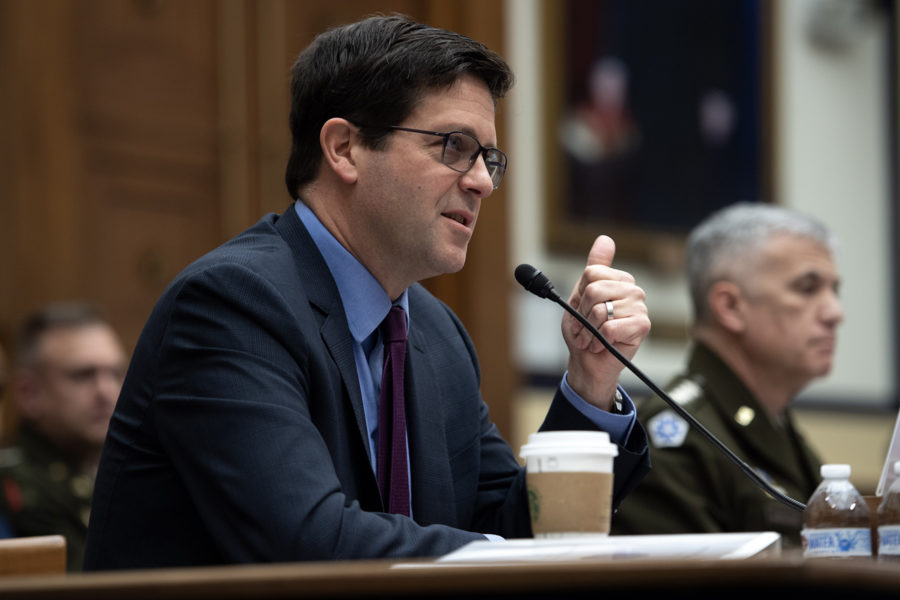A year after the Department of Defense was to report to Congress on whether it could declassify more Space Force programs, lawmakers are still waiting. Pentagon officials say only that they’re working the issue.
Rep. Doug Lamborn (R-Colo.) asked Assistant Secretary of Defense for Spacy Policy John Plumb on April 26 about progress on a report required by the 2022 National Defense Authorization Act, which told DOD to review every Space Force program and determine which could be moved to a lower classification level and which could be moved into the open. The report was due April 26, 2022, but it’s not yet completed.
Plumb declined to offer details.
“On the Space Force capabilities and classification, we might better save that for the classified session,” Plumb said. “We are working hard on it and I’m working with your team on this. As you know, there is a [Secretary of the Air Force] reform effort and I have been loath to get ahead of that.”
The following day, on April 27, Lamborn asked Air Force Secretary Frank Kendall how declassification efforts are progressing.
“The major effort that we’ve done recently on that is called Special Access Programs, where the Air Force, in particular, has a great many compartments and it’s hard to move across them,” Kendall said. “The work we were doing on the Operational Imperatives, we had to go do an extensive amount of bureaucratic work to allow people just to talk to each other so they could share information.”
Kendall offered no update on declassifying any specific Space Force programs. But he acknowledged that “we just saw a glaring example, a very visible example of what happens when you don’t do that, what kind of things can get out,” referring to the recent arrest and ongoing investigation over alleged leaks of classified documents spread via online chat rooms.
“We do need to protect our sensitive information, Kendall said. “So this is not a simple problem. It has a lot of different dimensions and we’re trying to attack all of them.”
The push to declassify elements of the military space program was first championed by then-Vice Chairman of the Joint Chiefs of Staff Gen. John E. Hyten and quickly taken up by the first Chief of Space Operations Gen. John W. “Jay” Raymond, both of whom said classification made it difficult to make clear to the public why the United States needed a Space Force in the first place. Others advocates argue that over-classification hurts deterrence and hampers international and inter-agency cooperation.
Kendall agreed, suggesting there are “things where we can work with our partners, work with commercial industry much more effectively, if we can declassify.”
Speaking with reporters at the AFA Warfare Symposium in early March, Chief of Space Operations Gen. B. Chance Saltzman said he was “comfortable” with current classification and the level of public disclosure, particularly when it comes to deterring threats in space.
“I think we have the ability to show enough capability, as I mentioned, through resiliency—in other words, to disincentivize the attacks,” Saltzman said. “The idea of reveal and conceal, that’s almost a way of saying if an adversary is not paying attention to you, are they deterred by you? You can talk yourself into a lot of circles about, ‘If I don’t know there’s a capability, will that deter me from something?’ That’s not how we need to talk about deterrence in space.”
The Future Home of U.S. Space Command
ILamborn also asked Kendall to make the case for keeping the headquarters of U.S. Space Command at Peterson Space Force Base, Colo., rather than relocating it to Redstone Arsenal, Ala.
“I understand that the command is months away from achieving full operational capability at Peterson Space Force Base in Colorado Springs,” Lamborn said. “This means that we will be moving backwards in our efforts to organize space as a warfighting domain if we move the command away from Colorado Springs, wherever it might be moved to, because moving would delay full operational capability by four to six years.”
Kendall, whose oversight does not directly include U.S. Space Command, but who does have jurisdiction over the Space Force Guardians who make up more than 90 percent of the command’s personnel, offered no indication of a preference. “We’re trying to take into consideration all possible factors that will affect final decision,” he said.
The fight over SPACECOM’s permanent headquarters is now in its fourth year. The selection of Redstone Arsenal in January 2021 sparked investigations by the Government Accountability Office and the DOD Inspector General over allegations of political bias. Former President Donald J. Trump took credit for “single-handedly” choosing Redstone, but both the GAO and IG reports concluded that the decision was lawful. Alabama lawmakers on the committee repeatedly pushed Kendall to move forward and confirm the selection of Redstone as final.
“Twenty-seven months ago, the Air Force made the right decision to go with Huntsville, Ala.,” said Rep. Mike Rogers (R-Ala.), who was a central figure in re-establishing U.S. Space Command and the U.S. Space Force. “Twelve months ago the GAO and the DOD Inspector General affirmed that decision. There is only one state still protesting, and that state came in fifth in the competition. The political games must end. Your continued hand wringing is delaying SPACECOM’s full operational capability and undermining our ability to defend this nation. You need to end this charade and make that announcement soon.”

